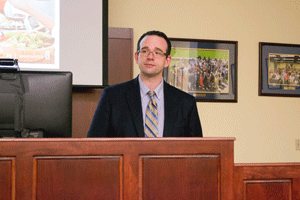Story by Kayla Harrell, Staff writer

Milton Stokes, director of global health and nutrition outreach for Monsanto, gives a seminar about innovations in agriculture Monday.
Milton Stokes, director of global health and nutrition outreach for Monsanto, hosted a seminar at Murray State Monday called “Innovations in agriculture, food security, nutrition and GMOs.”
“We cover everything that he talks about,” said Hannah Martin, adjunct professor in the Hutson School of Agriculture. “So it was extremely relevant for what we study.”
Monsanto is a sustainable agriculture company that delivers agricultural products that support farmers all around the world, according to Monsanto’s website. Stokes said Monsanto employs 20,000 people around the world.
“Everyone in ag knows about Monsanto,” Martin said.
BACKGROUND
Stokes grew up in Hazel, Kentucky, where his mother owned her own restaurant.
“I’m not a farmer,” Stokes said. “I didn’t grow up on a farm.”
Stokes graduated from Murray State with a degree in nutrition. Later, he received his master’s degree in public health and his doctorate in communications and marketing.
Stokes taught nutrition at the University of St. Joseph in Connecticut.
Now, Stokes is one of two dieticians employed by Monsanto.
“The people the farthest from the farm are the ones talking about what farming should look like,” Stokes said. “In nutrition, there are audiences that think they know what farmers should be doing, yet they haven’t talked to any farmers.”
SEMINAR
The seminar consisted of discussions on food security, global nutrition, innovations within agriculture and genetically-modified organisms (GMOs).
Stokes said malnutrition consists of two spectrums: undernutrition and hunger and overweight and obesity.
About 795 million people, or one in nine, in the world suffer from undernutrition, according to the 2015 world hunger and poverty facts and statistics by the World Hunger Education Service.
“Here in the United States, there are 50 million Americans who are hungry,” Stokes said. “The ironic thing is those people, many of them live on farms or near farms. It’s the folks growing food for us and the rest of the world who can’t themselves eat.”
Stokes said innovation is all around us and breeding innovation has yielded today’s food.
“The food we eat today is not how it originated back in the day,” Stokes said.
Biotechnology is not something Monsanto created. Mother Nature genetically-modified sweet potatoes 8,000 years ago, Stokes said.
Biotechnology in plant agriculture has come to mean the process of intentionally isolating a gene coding for a desired trait from one plant or organism and using it in another plant. The result is a GMO, according to gmoanswers.com.
“As an ag major, a lot of times we hear about what we should do with GMOs, how we should talk about GMOs from other people who are ag backgrounds,” said Melissa Schenck, senior from Boston, Kentucky. “So it was a little different to be able to hear this information from someone who didn’t grow up on a farm and instead has a dietetic background.”


























































































